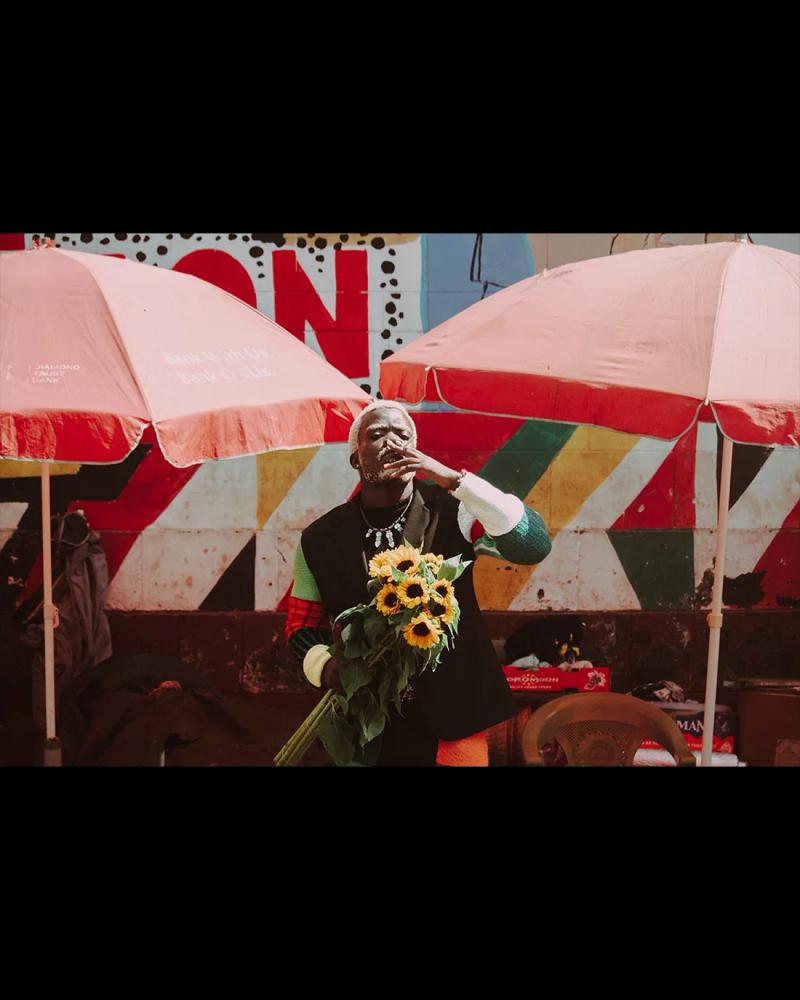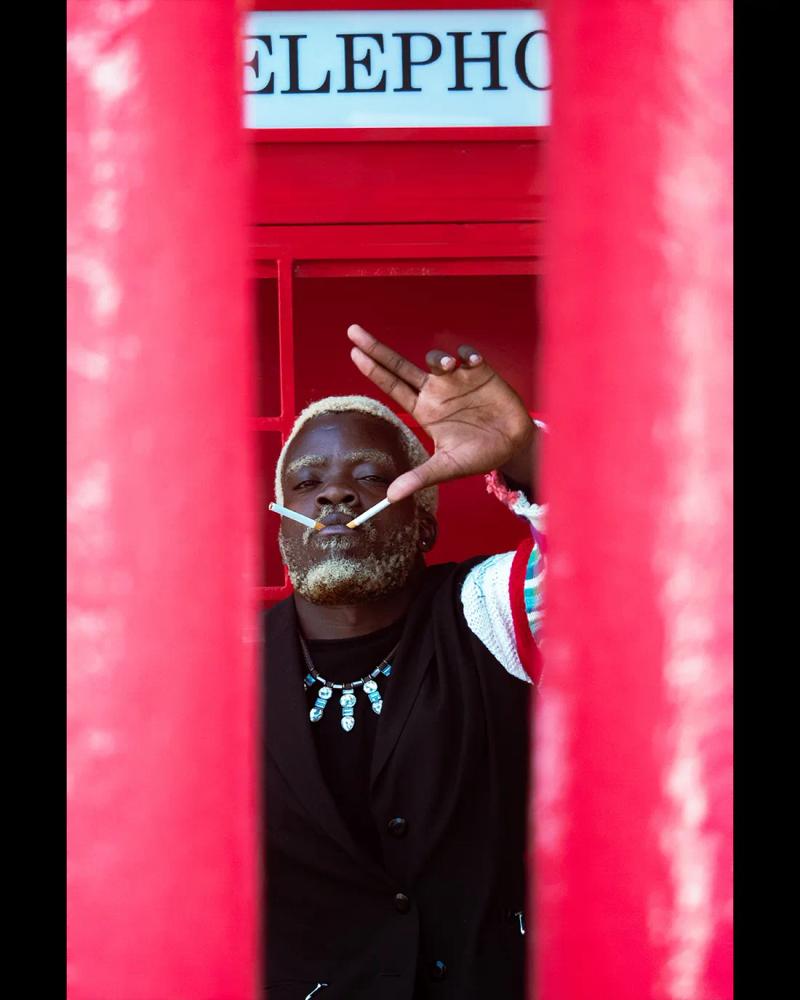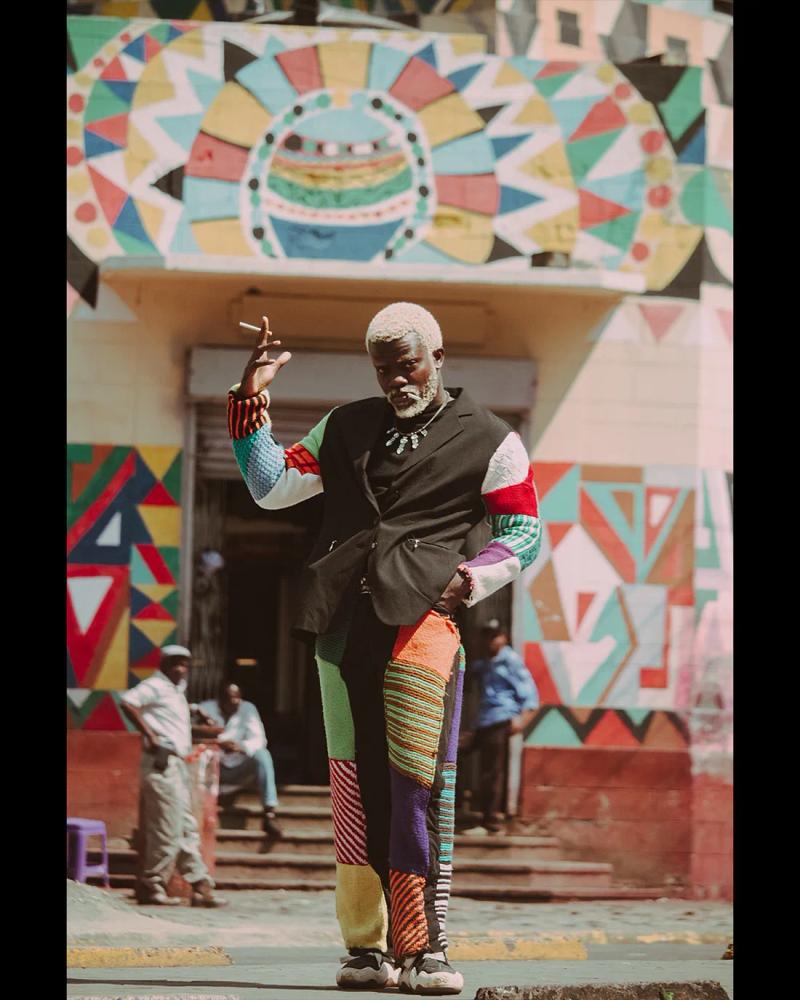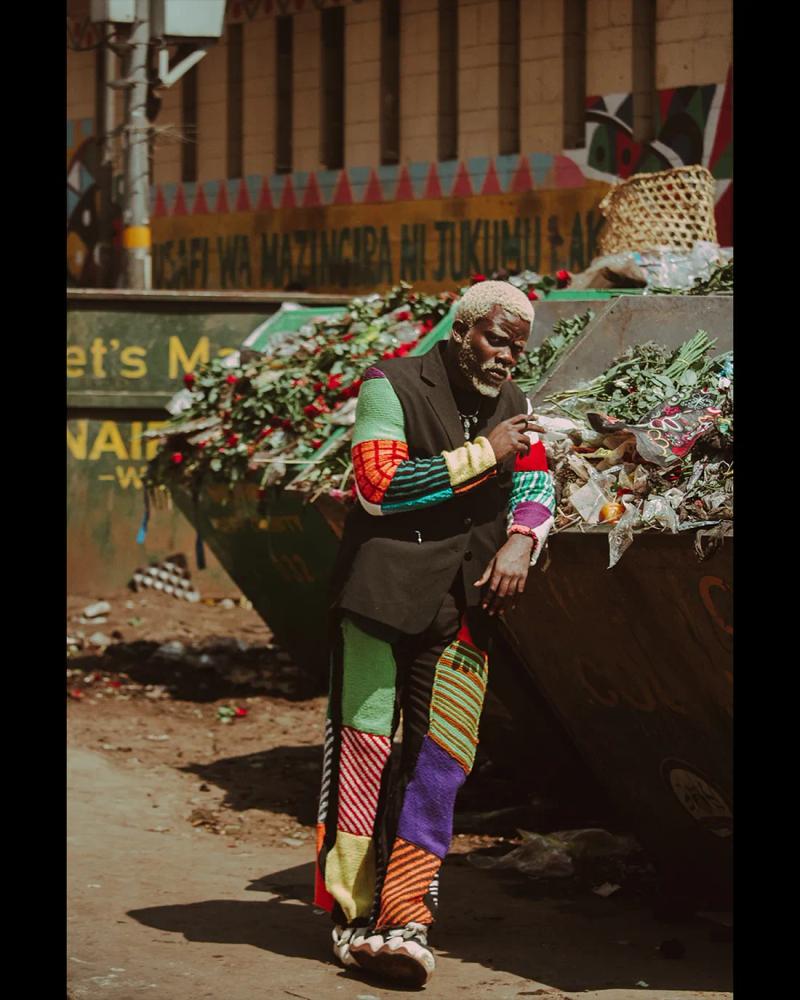in-conversation
In Conversation With The Revolution
by Carl Omolo
July 29, 2024

in-conversation
July 29, 2024

In a protest, there are different people. We are not a monolith. In broad strokes, you would have your pick of three factions: the front-liners, the middle mass and the cast.
The middle mass is where the majority lies. You are the beating heart and voice of the whole cause. This strength in numbers manifests the righteousness of the cause and without you it would not be seen, would not be felt, would not be heard. This is probably where you would be as a scared first timer; or as a scared second timer acting brave for a first timer; or as a concerned mother not convinced but there, if only to take care of their hysterical, over-eager children; or as a curious glory hunter, looking out for an empty teargas cannister to evidence a story you have already exaggerated in your head.
Regardless of the individual threads, you are here as one flag. And more than just being the spirit of the protest, you need to use that voice to scream at injustice wherever it may be. Because there are wolves at your heels. This strength in numbers also has the weakness of hiding ill-meaning police officers, enemies of the revolution. As such, the middle mass looks out for each other, the middle mass shares resources to keep everyone on their feet, the middle calls out when any among them is abducted, even stepping in to stop it. You will not make headlines, you will sweat teargas by noon and you might even get arrested, and I cannot even say you will feel satisfied or heroic at the end of it, but you will know what it means to feel the state’s violence on your neck. And it is an understanding you will hold on to forever. Besides, you might meet someone.
Well?
Maybe that’s not for you. You could instead join the supporting cast. These are the people not directly part of the protest, but enable and support and sustain it. They are the friends on call, ready to pick you up; they are the lawyers camping out at police stations to ensure bail is given to anyone arrested, they are the first aid medics keeping everyone alive, they are the Java security guards granting tired protestors refuge, they are office workers throwing water from above; they are the people who could easily look away, who could easily turn their backs but don’t. Who care and in the decisive moment when the rubber hits the rod, held firm. Who absolutely have something to lose and risk it all regardless.
I do not include the online warriors here and I will make no apologies for that. Don’t get me wrong, online activism is important and effective but only when it is tied to the material conditions on the ground; only when it is used to spur action or cause disruption. Otherwise, it is only voyeurism; just looking at the actions or sufferings of others to gratify yourself as part of their cause. Educate, expose, amplify, disrupt; we all have phones, we can all use them to do something. But if your activism starts and ends on the screen, there is always a piece of the puzzle that you won’t find, and you need to ask yourself what stops you from taking that actual step. And you need to decide whether you can make peace with that answer.
But I guess if you’re still reading this, you aren’t satisfied with that.
Or any of the other ways for that matter.
The front-liners are the bleeding tip of the spear of revolution, and I do not use bleeding metaphorically. The people we stand against have no conscience or sense of responsibility or proportionality; if they did, we would not be having this conversation. Our blood is spilt in service of the cause, our blood has been split in service of the cause, our blood will be split in service of the cause. Joining the front lines just brings you eye to eye with this fact. We were always going to die: from floods and crumbling infrastructure, from abductions and police brutality, from incompetence and greed, or from failing medical institutions and poor education. What unites the front line is the senseless brutality of a government that steals even borrowed time.
They are the press, official and unofficial, ensuring that our stories are told as they happen; they are the trouble-makers, holding the line against the police; they are the daredevils; they are the martyrs. They are all these things, they are more. In the new Kenya, their names will carry into the second and third generation: Rex Kanyike, Emmanuel Tata, David Chege, Denzel Omondi; remember those names.
It’s interesting the role that art and fashion plays in tumultuous times like these. The pedestrian assumption is that they are the first industries to take a backseat. The least useful in times when ‘real things’ matter. Who cares about art when the country burns around us? Even artists themselves can be seen as softies or hermits, who would rather isolate themselves and then come out of their huts when the fighting’s finished.
That would be terribly mistaken. Art draws from the blood of our every day. Marwan Makhoul writes, “In order for me to write poetry that isn’t political / I must listen to the birds /and in order to hear the birds / the warplanes must be silent.” Art becomes of even greater importance in times of strife, and artists transcend from their place on the margins to become the movers and voices of the movement.

I found myself attesting to this first hand when, on the Black Tuesday protests, I met with the model Ochichi, which was a bit like seeing your teacher at the grocery store. I was used to being stunned by him and his looks and his walks, so it was somewhat novel to see him in that context. But again, conversely, I shouldn’t have been too surprised. He was always going to be the star, so even there, he was front and centre. You may have even seen him put his life on the line to save his fellow protestors.
I had to sit down with him and have him talk us through that insane experience. This is what we talked about.
All right, let’s get it. The first thing I want is for you to just tell me about yourself. Are you an introvert or an extrovert? Who are you? You’re this hero to me because now you’re going out saving lives but who are you internally to yourself?
Well, the first fundamental thing about me is that I am an actor. I’m very passionate about it. So much so that I do method acting; which, if you don’t know is when you try to fully inhabit a character that you want to play. So say, if I wanted to portray a conductor, I would actually go and do the job for weeks so I actually know what I’m embodying. At home, I am the only boy with three sisters. And you asked if I’m an introvert or I’m an extrovert but actually I enjoy being out there with people, interacting and stuff, you know, because of the method acting I do and every single day I try and learn something new from someone. So when I meet new people, I try and see what they have to offer the world and then I take it and I keep it in me.
So, in the story of your life, you so far have had your body, your work as a model, your work as an actor; and now saving lives in a time of revolutionary importance. did you see this coming?
In my head, yeah, somehow. When I was a kid, I always wanted to be a soldier, you know, and then my mom was like, “Nah, you’re gonna get killed,” and so I couldn’t do it. Though, every time I was watching these military movies, I would always put myself in that place where I was like, if that was me, I would have done this and that, you know.
Now, what happened during the protest was actually heavy but I wasn’t able to see it as a very dangerous thing. To me, it’s like a game, you know. I was like, you know what, let me go save this guy, he’s been hit, you know, let me go help another brother. So, when I was doing it, I was just, you know, thinking, oh, I need to stop the bleeding, I need to do this, you know, like in the movies, you know. Yeah, now and I was like, you know what, let’s get to safety first and then we’ll see what happens. So, we got to safety and then after that, you know, I went back home nd someone sent me a video. Yo, I saw you save someone! And I watched the video. I was like, nah man, what? That’s crazy, you know.

When I was doing my research, I saw that you’ve done a bit of modelling work. Do you see an association between your artistic side, the acting bits and the discipline required to build your body?
You mean, my physique?
Yes.
Yes, pretty much yes. I’m forced to, I’m actually supposed to get in shape because of the kind of person, the kind of brand I’m building for myself, you know. I want to be this actor who’s buff, who’s huge and apparently, you know, modeling thing, it came along the way when I was just experimenting with the acting and so I realized, when I’m on stage, everyone else looks skinny and tall. Most of the guys, I see that a lot and I was like, you know what, I want something different. I want to look huge and then I tried it and I was like, maybe I color my hair white, maybe as white to make me look, you know, like this character, you know. So yeah, I think there is, yeah.
How did you see the situation you were in, in Kenya and how it relates to you? Like basically, why were you out there that day on the protest? What brought you there?
All right, there was about the first protest, I went there for fun, right? Well, not for fun actually, but I was just like just let me go see, right? And I go out there, because there’s a friend of mine, she’s doing beauty stuff, so she wanted to do my nails, you know, like for the exam stuff. So, I was like, all right, you know what, I’ll pull up, you go do my nails and my stuff and let’s see what happens and then when I was in town, I was like, “all these people? what is going on!?” you know? So, I started asking, oh, so that’s what’s going to happen if this (bill) passes? Nah man, this guy needs to go, you know? I was like, okay. So, the second protest, I was prepared and I was like, you know what, let me go, let me go. It’s like, I get to town, this guy stops me because of my fashion, he’s like, you’re in the middle of this video fashion, right? Let me interview you. So, he starts interviewing me and then this police guy shoots my thigh with a canister and that’s when I was like, ah, okay, you think this is a movie? All right, let me show you and then we went, we started pressing, pressing and that’s when things got crazy, you know?

So now I see it was like one of your first, first protests, you’re not a seasoned veteran.
Yes, because most of the time, I was just watching our parents do it, you know? And this was my first heavy experience, not with guns though, you know, like I’ve been shot at before.
Really?
Yeah, I mean, the bullet didn’t get to me but I’ve been in a place where I was almost shot. I grew up during the post-election violence [2007], I saw my friends in Mathare — because that’s where I was brought up. I saw my friends get butchered when I was over the balcony, you know, and they were killing Luos, you know, and then when I looked down, they killed them and they were still cutting them into pieces and that’s when someone looked up and said, “That’s another Luo,” you know, and I remember leaning back and I was a kid, I was freaked out and then my dad had to find a way to hide me and then the next day we had to find a way to go to the village and that’s how I survived and then I grew up in the village, the rest of it. Now when I came back, then there’s something else with this maandamano now.
Oh my. That’s heavy. Do you think that experience shaped you into what you are today or?
Yes, I feel like I want to put, I want to spend the rest of my life serving humanity, saving people, you know? I’ve always wanted to make a superhero movie but now I want to save people in real life too, you know. The last protest, last Tuesday, I wasn’t able to go in because of my dad but I watched videos of people bleeding, someone died and, in my head, I was like, I would have stopped the bleeding, you know, so it’s making me… I want to put myself out there to help people a lot, yes.
What goes through your head when you’re out there? Is it pure adrenaline? Is it fear? You’ve told me it’s like a game basically, you’ve fulfilled the objectives. Now is that all? Is there any adrenaline? Do you feel like it’s you in your body? Do you dissociate? What happens?
I feel like someone is watching me and so I’m giving them a good show, you know? And it also feels like, it feels like, oh man, I’m about to die, I’m going to die, oh look at all these people, you know, so it’s excitement, it’s a lot of tension, fear but in my head, someone’s watching me and I always think, okay, what if they’re watching this? How does this look? That’s how I find myself doing heroic stuff.
Do you think you’re the same person now and before it happened? Like if you told this story to a younger version of yourself, would they believe it?
Probably not because they would be like, anyone hears a gunshots and they would run away. Maybe unless I show them the videos and stuff. I feel like I’m not the same person I used to be, that’s just how I can put it because I’m not able to get enough sleep nowadays. I keep waking up in the middle and I’m like, oh what was that, you know?
I think it’s because I witnessed someone die, you know, his name was Erickson. Erickson died and I saw him die. I also saw someone’s brain blow up in front of me, yeah, I saw a bunch of nasty stuff, you know?
That was during the invasion of Parliament, black Tuesday right?
Yeah, yeah, just outside the parliament because outside the parliament there was a bunch of, there’s a group of guys who were trying to get over the fence, right? We were the guys who were trying to use the gate, you know, so we were trying to be official, you know?
(Laughs) It’s a protest but we still live in a society right?
You know? Now as we were getting there, I see like a bunch of guys inside the Senate with some, some rifles, right, and in my head I go, wait, you know what, maybe, let me stop again, so in front of me was Ian, Erickson, the guy whose brain got blew up, and the other dude and I saw them drop down and I was the only one left. Like there was, there was a bodaboda guy who survived and also and there was a guy, I think that was a medic, he had like gloves on and stuff.
I was like, hold up. So instead of me running away, I just started running towards these bodies and I go to Erickson, there was a bodaboda guy and the medic guy and I look at Erickson. He’s gone, he’s going, he’s gone. Ad then the guy goes, yo, look at the next guy and that was Ian, so getting to Ian, the second I get to Ian, they started firing even more, even more, yeah, and that’s when I was like, okay, you know what, this is heavy, this is crazy, yeah.
But somehow it’s, there’s a bit of excitement behind it, I won’t lie, you know, because I don’t think I’m terrified, I think that feeling makes me happy but I just don’t want to see people lose their lives, you know, I was okay with the tear gas, with being running around with the water cannons but now live bullets, I was like, hold up, you know?

Would you do it again, if you had a chance to do it all over again, would you do it again and would you do it differently?
I would definitely do it again, then I would also do it differently, I would carry, what is it called, the first aid kit, I’d carry it in a bag and just dress like a military guy and just look for people who are hit and save them.
What would be your message to someone who’s at home, who’s never been to the protest, who’s scared but they do care and they do want to make a difference, what would you tell them?
There’s a bunch of ways to go about it, they can do the online work, really helps a lot, you know, those memes and stuff really help a lot.
On the ground, I feel like women should not go and if they have to go, they shouldn’t be on the front line, they should just be behind us, you know? Because it’s very, it’s crazy, bro, I don’t want to see women losing their lives and stuff. Well, it’s not like I want to see men lose their lives but I would rather I go first than see another girl down, you understand? I just keep thinking about my sisters, and it’s like, I would rather they stay at home or they were there but somewhere safe, you know?
Lastly, okay, what would be your message to those who stand against you and your cause?
One way or the other, right, we don’t care about what is it, these political careers of yours. The only thing we care about is making the country a better place and if he’s fighting to protect that seat, we are fighting to make the country better, so let’s just see who wins.
Perfect. Excellent note to end it on.